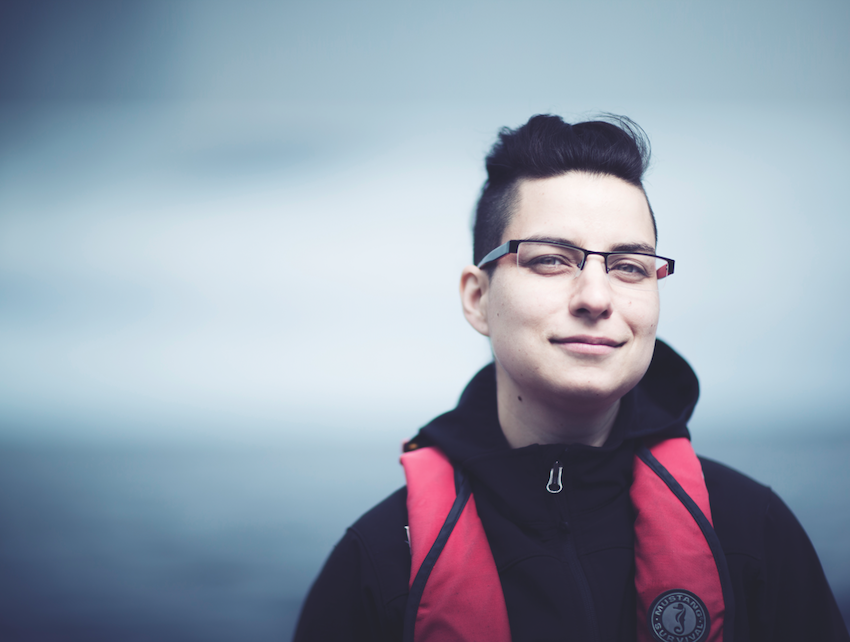Max Liboiron is an assistant professor of geography at Memorial University in St. John’s, N.L., where she directs a marine science laboratory rooted in feminist and anti-colonial practice. She spoke with Susan Nerberg.
Susan Nerberg: You have a background in art but you teach environmental science. Can you tell me about this crossover of art and science?
Max Liboiron: I started with a degree in biology. Then I went into art because I thought it was more ethical at the time. Then I went back into science, but from a social-science perspective. When I came to Newfoundland and Labrador, I came equipped to be able to critique science from a social-science perspective — there was no science critique because the Conservative government had gotten rid of or not started a lot of environmental monitoring programs, so I turned back to science because of what’s called the “undone science.” That stuff wasn’t happening.
SN: In terms of science being colonial — is that something that you’ve always thought, or was there a moment when you realized that something wasn’t right and we need to do something about it?
ML: I left science during my undergraduate because I thought it was unethical. That’s the language I had available to me.
SN: What was unethical?
ML: I thought the research questions being pursued were not in the best interests of communities or people or the environment. I saw a lot of profit-driven research questions that teachers and people in my science community were pursuing. The genome project was happening and that was sketchy, and that was part of why I left — the hyper-individualism, the ethno-centrism, a weird idea of what was a good idea.
The colonial critique is more recent. It was in my 30s and onwards that I was able to articulate that.
Colonialism means settler colonial access to Indigenous land for settler colonial goals, including benevolent ones like environmentalism. It took me a long time to understand that environmentalism can be doing colonial harm, like using Indigenous land for recycling facilities or incinerators, which pollute, to reduce waste. Science and scientists collaboratively assume that there is a normal. That sort of aggressive universalism is one of the hallmarks of colonialism. It’s an aggressive self-portraiture, making the entire world into its own image. That doesn’t really work.
More on Broadview: Inuk environmental advocate on the disappearing Arctic
SN: So take me into one of your classes. How do you teach anti-colonial science?
ML: In class one, we start by reading and understanding what colonialism is compared with other bad things, and understanding the difference between colonialism and capitalism, even though they overlap. We talk about settler colonial entitlement to Indigenous land for settler colonial scientific goals, such as picking plants for identification, doing beach clean-ups or getting rid of toxic waste. In class two, it’s not only that it’s colonial, but how it’s colonial. There’s assuming you can go places, that you have access to places in a very literal sense.
In the next class, we say, “what would be a non-colonial or anti-colonial way that doesn’t assume access if you want to do plant identification or if you want to do a beach clean-up?” The students come to understand that being anti-colonial doesn’t always mean you have to go to Indigenous science, which is anti-colonial, Indigenous people doing science. Feminist and anarchist ways can be anti-colonial. Not being a jerk or following bureaucracy properly can also be anti-colonial.
SN: What makes your lab, being feminist, different from other labs?
ML: There’s a big difference between being a feminist — running a lab and not being a jerk — and running a feminist lab. There are many of the first, but not too many of the second. You take the insights of feminism and you bake them into the methods of your science. For us, we think about the differences between equality and equity. The most common example is scientific papers. They can have 57 authors; the way you order them is that the first author gets the most credit, and then you get paid less the further down you are on the list. But in feminism, paying people differently is not okay, but you can’t lump them all in the front either.
Our lab’s process values different forms of labour — not just doing statistics and writing, but also gutting the fish, cleaning up, organizing meetings. The people who usually get forced out of science tend to be women, people of colour, people with disabilities, junior folks. In our process, they’re put first. That’s equity as opposed to equality. We ask, how can we do statistical sampling more equitably? How can we do it in an anti-colonial way? Our lab is an incubator for methods: scientific ones, but also anti-colonial and feminist methods. There are not a lot of road maps for this kind of stuff.
SN: What is the biggest challenge with the work you’re doing?
ML: Probably diversity. We have a lot of diversity in the lab, which is good because it means a lot of people bring a lot of ideas and it’s hard to assume that certain things are normal. But it also means people are bringing in different ideas about what is good. Good land relations for a settler can look very different for Inuit, for Innu and for Métis. The interesting and crucial issue that we’re looking to manoeuvre — it’s not a solvable problem — is, how do you deal with very conflicting “goods”? So when, say, we’re done with fish guts, some people say incineration is the greatest good. Other people say, “no, fish are relatives and you do not treat them like biohazardous waste. You have to return them to the water.” So what do we do? They’re both good. I don’t think other labs have those problems because they don’t have the kinds of questions we have.
This interview has been condensed and edited. A shorter version first appeared in Broadview’s June 202o issue with the title “Max Liboiron.”
Broadview is an award-winning progressive Christian magazine, featuring stories about spirituality, justice and ethical living. For more of our content, subscribe to the magazine today.















